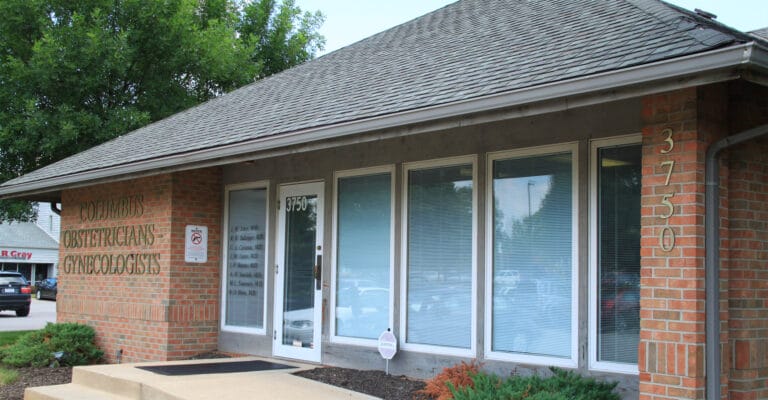Your first OB/GYN visit may bring up a lot of questions.
This guide helps you prepare for your first OBGYN visit, so you can feel confident and informed every step of the way.
Why Your First OBGYN Visit is Important and What to Expect
Your OB/GYN plays a crucial role in your reproductive health. This is more than just a one-time appointment; it’s the first step in building a relationship with a healthcare provider who will support you through various stages of life.
Regular visits to your OB/GYN help us detect potential health concerns early, which is vital for effective treatment and prevention. Conditions like cervical dysplasia, breast abnormalities, or sexually transmitted infections (STIs) can be identified before they become more serious, allowing for early intervention.
By starting this relationship early, you ensure that you’ll have a trusted professional who understands your medical history and can offer personalized advice and care tailored to your unique needs.
Medical History Discussion as the Foundation of Your Care
We’ll begin your visit by discussing your medical history. This is a crucial part of the process, as it helps us get a comprehensive understanding of your overall health.
This conversation will cover details about your menstrual cycle, sexual activity, and any specific concerns you might have. We’ll ask about the regularity of your periods, any discomfort you experience, and whether you’ve noticed anything unusual. If you’re sexually active, we’ll discuss your sexual health and contraception use.
It’s important to be open and honest during this discussion. The more accurate the information you provide, the better we can tailor our care to meet your specific needs. This initial dialogue is the first step in building a strong, trusting relationship with your OB/GYN, one where you can feel comfortable sharing even the most personal aspects of your health.
Physical Exam as Your First Step in Ongoing Care
After the discussion, we’ll proceed with the physical exam. This may include a general physical check-up, a breast exam, and a pelvic exam.
The breast exam is a routine part of the visit, where your OB/GYN will check for any lumps or abnormalities. This is especially important for early detection of breast cancer. We’ll guide you through the process, ensuring you understand each step and feel comfortable.
The pelvic exam is another essential part of the visit. Although it might feel a bit awkward, it’s quick and necessary for checking your reproductive organs for any issues. During the exam, your OB/GYN will examine the external genitalia, insert a speculum to view the vaginal canal and cervix, and, in some cases, perform a bimanual exam to assess the health of your uterus and ovaries.
Pap Smear if Needed for Proactive Health Screening
If you’re due for a Pap smear, we may perform this during your visit. This test is essential for screening cervical cancer and involves collecting cells from your cervix. Cervical cancer often has no symptoms in its early stages, which is why regular screenings are so important.
While it might feel slightly uncomfortable, the procedure is quick and is a crucial part of preventive care. The cells collected during the Pap smear will be sent to a lab to check for any abnormalities. If anything unusual is found, we’ll discuss the next steps and any further testing that might be needed.
Regular screenings like these will be a key component of your ongoing care with us, helping to catch potential issues early when they’re most treatable.
Discussion and Questions During Your Visit
After the exam, we’ll take the time to discuss any findings with you and answer any questions you might have. This is a crucial part of the visit, as it gives you the opportunity to address any concerns and learn more about your health.
This is your opportunity to talk about birth control options, ask about STD testing, or bring up any other concerns you might have. Whether you’re considering starting a family, managing menstrual pain, or navigating menopause, we’re here to provide the information and support you need.
Remember, this conversation is the start of an ongoing dialogue that will shape your care over time. Your OB/GYN is here to listen, support, and guide you through all aspects of your reproductive health.
Tips for a Smooth Visit to Set the Tone for Future Appointments
These practices will help ensure that your first visit is comfortable and that you’re well-prepared for future appointments.
Be Open and Honest
Sharing your complete medical history, including details about your menstrual cycle, sexual activity, past pregnancies, and any symptoms, is crucial for your OB/GYN to provide the best possible care. The more information you provide, the better your OB/GYN can tailor their advice and treatment to meet your specific needs.
Addressing even minor concerns ensures that nothing important is overlooked. Whether it’s a slight change in your cycle or a question about contraception, your OB/GYN is there to help you navigate these issues and provide the best possible care.
Prepare a List of Questions
Bringing a list of questions to your visit ensures that all your concerns are addressed. This is your time to ask about anything related to your reproductive health, and we encourage you to make the most of it.
Focus on key topics like birth control options, menstrual cycle irregularities, or any reproductive health issues you’ve been experiencing. Prioritizing your questions allows you to make the most of your time with your gynecologist, ensuring you leave the appointment with the answers you need. Don’t hesitate to ask for clarification if something isn’t clear—our goal is to make sure you feel fully informed and comfortable with your care.
Wear Comfortable Clothing
Choosing clothing that’s easy to change in and out of can make the physical exam more comfortable. Loose-fitting clothes simplify the process of undressing for the exam and help you feel more at ease during your visit.
The right outfit can contribute to a smoother and more relaxed experience. You might want to avoid complicated outfits with lots of layers or tight clothing, as these can make the exam process a bit more cumbersome. Simple, comfortable attire will make the visit more straightforward and help you feel more at ease.
Practice Relaxation Techniques
If you’re feeling anxious, practicing deep breathing or other relaxation methods before your appointment can help you stay calm. It’s completely normal to feel a bit nervous, especially if this is your first visit, but relaxation techniques can help you manage those feelings.
Arriving relaxed will make the physical exam go more smoothly and can also help you feel more comfortable during the discussion with your OB/GYN. Techniques like deep breathing, progressive muscle relaxation, or even listening to calming music on your way to the appointment can make a big difference in how you feel during the visit.
Bring Necessary Documents
Bringing your ID, insurance information, and a list of any medications you’re taking is essential for a smooth check-in process. These documents ensure that your medical records are accurate and up-to-date, allowing your OB/GYN to provide the best care based on complete information.
If you’ve had previous medical records or test results from another provider, bringing those along can also be helpful. This ensures that your OB/GYN has all the information needed to provide you with the best care possible.
Arrive Early
Arriving a bit early gives you time to complete any necessary paperwork and settle in before your appointment. This can reduce any last-minute stress and ensures that your visit starts on time, allowing for a more relaxed and efficient experience.
Taking a few minutes to relax before your appointment can also help you mentally prepare for the visit. Whether you use this time to review your questions or simply to take a few deep breaths, arriving early can help set the tone for a calm, productive visit.
Making the Most of Your First OB/GYN Visit
Remember, your initial visit to a gynecologist near you is all about you—your health, your concerns, and your future. This visit is a crucial step in your healthcare journey, marking the beginning of a valuable, long-term partnership centered on your well-being.
At Columbus OB/GYN, we’re here to support you every step of the way. Our goal is to ensure you leave your appointment feeling informed, reassured, and ready to take on whatever comes next. Whether you’re here for a routine check-up, have specific concerns, or just want to establish care with a trusted provider, we’re committed to providing the highest level of care and support.
This visit marks the beginning of a valuable, long-term partnership centered on your well-being. Your OB/GYN will be a key partner in your health journey, offering guidance, support, and expert care at every stage of your life.














